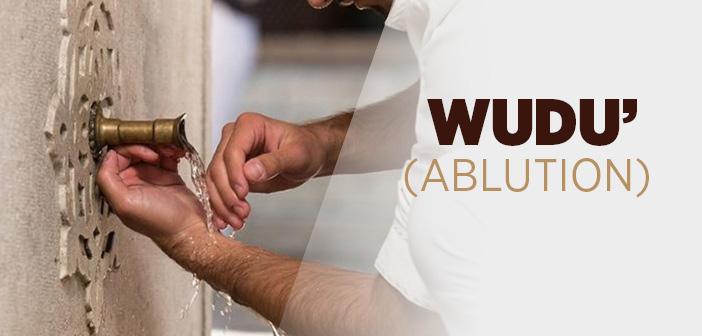What is wudu? What is ablution in islam?
Wudu’ is cleansing and wiping certain parts of the body before prayer or other acts of worship.
Just as performing wudu’ is an act of worship by Allah, it is also an act of physical purification. Thus, one who carries out ablution earns good deeds (hasanat). Wudu’ also erases past sins and results in forgiveness for them.
It is important to note what the The Prophet (p.b.u.h) has said:
“Whoever performs wudu’ as I do, his past minor sins shall be forgiven.”[1]
“‘If a man performs ablution perfectly and then offers the compulsory congregational prayer, Allah will forgive his sins committed between that (prayer) and the (next) prayer till he offers it..”[2]
“When the Muslim does wudu’ and washes his face, every wrong thing at which his eyes have looked leaves with the water – or with the last drop of water. When he washes his hands, every wrong thing which his hands have touched leaves with the water – or with the last drop of water. When he washes his feet, every wrong thing to which his feet have walked leaves with the water – or with the last drop of water, until he emerges cleansed of sins.”[3]
Wudu’ is a significant part of a Muslim’s life as it helps to abstain from sins and, in fact is the prerequisite of prayer, “the best deed.”[4] Regarding this matter, Rasulullah (p.b.u.h) has said; “The key to Paradise is Prayer, and the key to Prayer is Wudu’.”[5]
I. The Fard acts of Wudu’
The fard acts of wudu’ have been mentioned in the following verse of the Qur’an:
“O you who have believed, when you rise to [perform] prayer, wash your faces and your forearms to the elbows and wipe over your heads and wash your feet to the ankles..”[6]
Thus, wudu’ has seven fard acts:
- To make the intention.
- To wash the face (forehead to chin and ear to ear)
- To wash hands and arms (From fingertips until the elbow, including the elbow)
- Wiping over the whole head (masah)
- Washing feet including the ankles once
- Performing the wudu’ without long pauses between steps,
- Rubbing the wet limbs during wudu’
If a person has a beard and his beard is sparse (ie. Not dense) and parts of his skin is visible, he should wet these areas with his fingers during wudu’. However if his beard is thick and dense, he does not need to do so.
II. The Sunnah acts of Wudu’
There are eight sunnah acts of wudu’:
- Washing hands until the wrists at the beginning,
- Rinsing mouth,
- Inhaling water into nose,
- Blowing out the water from the nose,
- Wiping head from back to front (after front to back),
- Wiping in and out of the ears,
- Wiping the ears a second time after wetting hands again,
- Following the order when doing the fard acts during wudu’.
III. The Mustahab acts of Wudu’
- Saying “Bismillahirrahmanirrahim”
- Performing wudu’ in a clean place,
- Using minimal water during wudu’,
- If using an open container to take wudu’, placing it on the right side,
- Washing limbs thrice,
- When wiping head, beginning with wiping from front to back,
- Brushing teeth with a miswak,
- Washing the limbs on the right before left,
- Following the order when doing the sunnah acts during wudu’.
IV. The Makruh acts of Wudu’
It is disliked to do any of the following during wudu’:
- Performing wudu’ in a dirty place,
- Using excess water ie. wasting,
- Washing each limb more than three times,
- Exposing the ‘awra area during wudu’ ,
- Wiping the neck,
- Washing other than the areas that are fard,
- Abandoning the Sunnah acts.
Furthermore, talking or articulating anything other than dhikr during wudu’ is makruh. Our Prophet (p.b.u.h) would say the following while performing wudu’:
“Allahummaghfirly zanby wa wassi’ ly fi dary wa barik ly fi rizqy”
“O Allah, forgive my sins, widen my home and bless my sustenance (rizq).”
V. Things not permitted without Wudu’
The following five things are not permitted for a person who is without wudu’:
- To pray,
- To make tawaf around the Ka’bah,
- To write a verse or verses from the Qur’an,
- To carry the Qur’an,
- To touch the Qur’an: Touching even a verse or page of the Qur’an with a cloth or anything in between such as a twig is not allowed.
A woman bleeding due to menstruation or post-childbirth who is a teacher or learner of Qur’an may touch the Qur’an for this purpose. However a person who is in a state of major impurity due to sexual intercourse or emission of semen (junub) may not touch the Qur’an for any purpose.
In addition, it is not unlawful to touch or read tafseer (interpretation of the Qur’an) books for that matter.
It is recommended (mandub) to perform wudu’ in the following cases:
- To recite Qur’an from memory (by heart),
- To read hadith books or books regarding Islamic sciences or fiqh,
- To endulge in the remembrance of Allah (dhikr),
- To sleep,
- Before going to the market place or shopping,
- Before visiting the grave of a prophet,
- To visit a pious scholar or saint who is either dead or still alive,
- Before the presence of a state leader.
It is Sunnah to have wudu’ at all times, perform wudu’ before every prayer, and fall asleep while having wudu’. Wudu’ is the armour of a believer.
VI. Things that do and do not Invalide the Wudu’
Things that invalidate the wudu’ are divided into three groups:
1) Hadath: These are things that directly invalidate the wudu’. Things that are released from the genitals or the anus are in this category. Thus, breaking wind, faeces, urine, mazy, mani (semen), wady, blood during labour and istihaza blood all invalidate the wudu’ .
2) Things that lead to Hadath: To sleep, to be drunk, to faint, to go mad, to contact the opposite gender, a man touching his private part.
3) Those other than the previous two groups: To doubt one’s own wudu, and to leave Islam (apostasy).
Laughing out loud during prayer, eating camel meat, things released from the mouth, things that come from the private parts such as sand or an insect, a straw or finger entering the front or back, touching the private parts of a child, touching the anus or testicles, a woman’s touching her own genitals do not invalidate the wudu’.
VII. Wudu’ of a Ma’dhoor (Person with ‘Uzr)
A person who cannot maintain his or her wudu’ due to an impediment (constant invalidation of wudu’) is called a person with ‘uzr or a ma’dhoor. These people have constant discharge or any of the following released from them without control; urine, faeces, gas, mani, mazi, wady or istihaza blood.
The rulings regarding this matter are as follows:
- a) If the ‘uzr of a person is continuous throughout a whole period between prayers, he is not required to do anything extra. His ‘uzr does not nullify his wudu’, he may take wudu’ as every other person.
- b) If the ‘uzr of a person lasts for the most part of the period between prayers or half of it, it does not nullify his wudu’. However once the ‘uzr has paused, it is recommended that he takes wudu’ again.
- c) If the ‘uzr continues for less than half of the prayer period, the wudu’ taken previously is nullified. The ma’dhoor in this case is required perform wudu’ again.
[1] Sahîhu’l-Müslim, Kitabü’t-Tahare, 8.[2] Sahîhu’l-Müslim, Kitabü’t-Tahare, 6.[3] Sünenü’t-Tirmizî, Bâbü’t-Tahare. 2.[4] Sahîhu’l-Müslim, Kitabü’l-İman, 137.[5] Sünenü’t-Tirmizî, Babü’t-Tahare, 4.[6] Surah Ma’idah: verse 6
Source: Fiqh1 (According To The Maliki School Of Islamic Law), Erkam Publications





